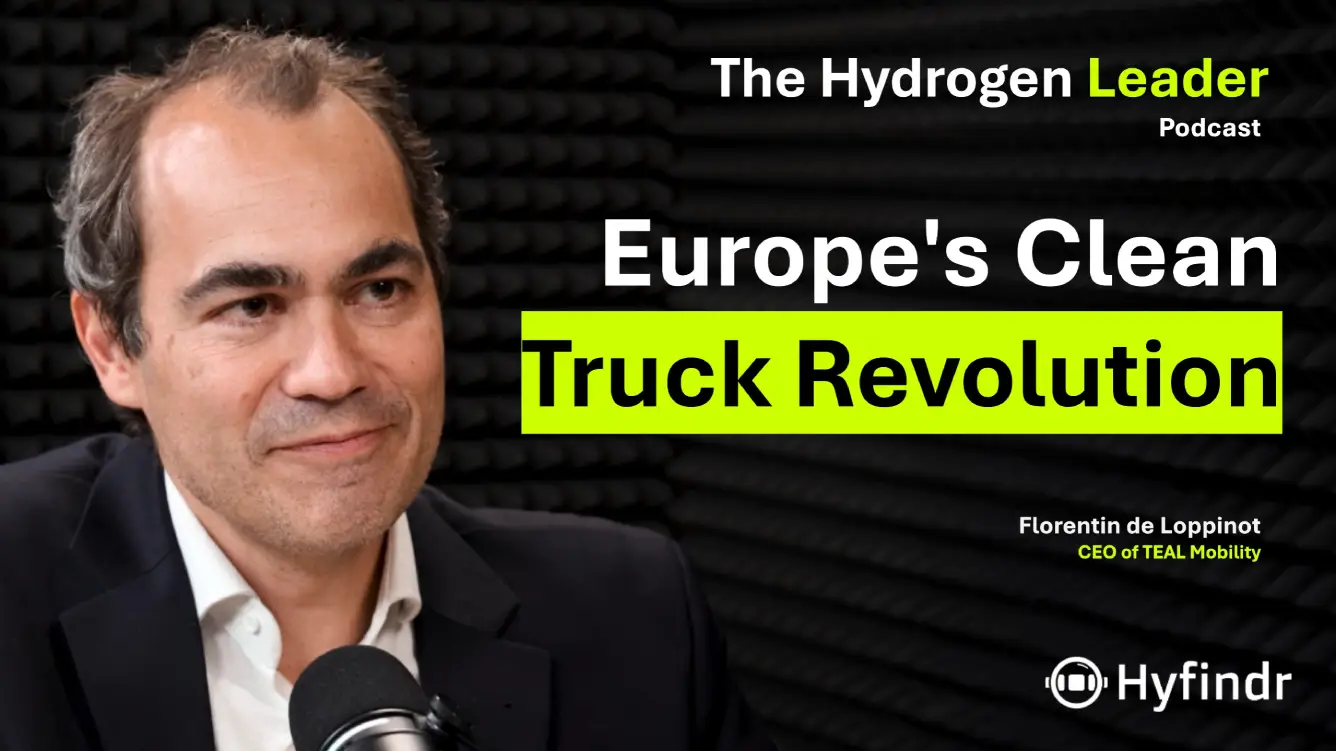In this episode of The Hydrogen Leader podcast, we sit down with Florentin de Loppinot, the CEO of Teal Mobility, a joint venture between TotalEnergies and Air Liquide focused on accelerating hydrogen mobility in Europe. Florentin shares his personal and professional journey, including his passion for road safety and the role hydrogen can play in achieving zero-emissions in the transportation sector.
From his experiences with TotalEnergies to his leadership at Teal Mobility, Florentin discusses his commitment to building a sustainable hydrogen economy, particularly for long-haul transportation. In this conversation, he also reflects on his career, leadership philosophy, and the crucial role that team building and critical listening have played in his success.
What Motivated Florentin de Loppinot to Focus on Road Safety and Hydrogen Mobility?
Florentin opens up about a tragic personal loss—the death of a friend in a road accident in East Africa—which motivated him to become an advocate for road safety. How did this experience shape his career and passion for cleaner transportation? Florentin shares how his commitment to improving road safety and reducing accidents led him to focus on hydrogen mobility, particularly for heavy-duty trucking.
How does road safety tie into hydrogen mobility, and what role can hydrogen-powered vehicles play in enhancing safety while also reducing emissions? Florentin talks about how Teal Mobility’s mission goes beyond clean energy, aiming to make roads safer for everyone.
What Is Teal Mobility’s Role in the Future of Hydrogen Transportation?
As the CEO of Teal Mobility, Florentin discusses the company's vision for the future of hydrogen mobility. What is the current landscape of hydrogen-powered transportation in Europe? He shares insights into the joint venture’s business model and strategic operations, aimed at accelerating hydrogen mobility solutions across Europe.
What is Teal Mobility’s approach to hydrogen adoption in long-haul transportation, and how is the company collaborating with key players in the logistics and energy sectors? Florentin explains how partnerships with companies like TotalEnergies and Air Liquide are vital in making hydrogen mobility a reality.
What Are the Key Challenges in Building Hydrogen Mobility Infrastructure?
Hydrogen infrastructure remains one of the biggest barriers to scaling hydrogen mobility. What are the challenges Teal Mobility faces in building a robust refueling infrastructure for hydrogen vehicles? Florentin highlights the importance of having hydrogen fueling stations strategically located throughout Europe and explains the technical and logistical challenges involved in building this network.
What role do hydrogen refueling stations play in expanding the adoption of hydrogen-powered trucks? Florentin discusses how Teal Mobility is addressing these infrastructure gaps and working with stakeholders to ensure a sustainable hydrogen fueling network.
How Does Hydrogen Compare to Battery-Electric Trucks in the Logistics Sector?
The conversation also touches on the ongoing debate between hydrogen and battery-electric trucks. What are the advantages of hydrogen mobility compared to battery-electric solutions in the context of long-haul trucking? Florentin compares the two technologies, emphasizing how hydrogen is better suited for heavy-duty transport and longer ranges, while electric trucks may be more effective for short-haul operations.
What is the future of zero-emission trucking, and how can hydrogen contribute to achieving net-zero emissions in the logistics industry? Florentin shares his vision for integrating hydrogen and electric vehicles to create a more efficient, sustainable transport ecosystem.
What Role Do Regulations and Government Support Play in Advancing Hydrogen Mobility?
Government regulations are a key factor in accelerating hydrogen adoption. What role do regulatory frameworks play in the development of hydrogen mobility? Florentin discusses EU regulations, such as the Alternative Fuels Infrastructure Directive, and how these policies are critical for scaling hydrogen infrastructure.
How can governments support the development of hydrogen mobility infrastructure and the widespread adoption of hydrogen fuel? Florentin emphasizes the importance of policy support and collaborative efforts to ensure that hydrogen mobility becomes a viable and sustainable solution for Europe’s transport sector.
What Is Florentin de Loppinot’s Leadership Philosophy?
Florentin shares his leadership philosophy, which focuses on empowering people, listening critically, and learning from mistakes. What makes a great leader in the fast-evolving hydrogen and energy sectors? Florentin explains how his leadership style has been shaped by his experiences in multicultural environments and the importance of building diverse, motivated teams.
What leadership qualities does Florentin look for in others, and how does he apply these values at Teal Mobility? He emphasizes the significance of teamwork, collaboration, and entrepreneurship in advancing the hydrogen agenda.
What Is the Future of Hydrogen Mobility?
As the conversation concludes, Florentin shares his optimistic outlook on the future of hydrogen mobility. What’s next for hydrogen transportation, and how can Teal Mobility help accelerate its adoption? Florentin discusses the potential for hydrogen to transform the logistics industry, the technological innovations in hydrogen-powered trucks, and the regulatory support needed to make hydrogen more affordable and accessible.
How does Florentin envision hydrogen shaping the future of clean logistics by 2030? He envisions a future where hydrogen-powered vehicles are commonplace, making significant contributions to carbon neutrality and clean energy.
To hear more from Florentin de Loppinot on hydrogen mobility and the future of clean transportation, listen to the full podcast episode here.
If you found this discussion valuable, don’t forget to subscribe to The Hydrogen Leader podcast. Join Dr. Björn Lüssow for more expert interviews on leadership, innovation, and the future of the hydrogen economy.

